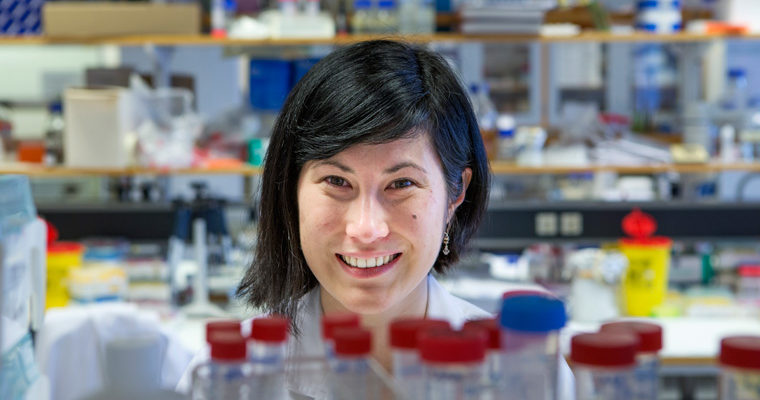Despite some years of really struggling financially, Iceland has been able to maintain its position as a provider of unique experimental settings for drug discovery. Today life science in the country has never been stronger.
Looking back 20-30 years the country has witnessed a dramatic leap forward within life science. Back then there were a few labs focusing on basic research in the University and at the National Hospital, notes Sigríður Klara, Director of the BioMedical Center (BMC) at the University of Iceland.
“Several of those labs were well known internationally. For example, one of the pioneers in molecular life sciences, Professor emeritus Gudmundur Eggertsson, was responsible for bringing DNA cloning to Iceland shortly after the technique was invented. This had a major impact on the students and the research environment. Eggertsson has been called the father of the molecular genetics in Iceland,” Klara says.
Important human genetic findings
A great part of the country’s achievements in life sciences is also thanks to its history and its population. Because of its unique combination of genetic homogeneity, genealogical tradition and high participation in research, the country has been a prime location for discovery and validation of drug targets. Research findings documenting variations in the genomes of Iceland’s inhabitants have laid the groundwork in the development of effective therapeutics for genetic disorders over the past two decades.
Much of this research has been driven by the company deCODE, founded in 1996 by Kari Stefansson. Stefansson and his colleagues curated all available genealogical information into a single online database. Through integration with two other databases, one detailing genetic information collected from biological samples of more than 100 000 citizens and the other storing medical records of people participating in related research projects collected from national registers, the research power came. In 1998 Hoffman-La Roche invested 200 million dollars in the company and in early 2000 deCODE invested in its own diagnostics and drug development, advancing one therapeutic as far as phase III trials. After the 2008 financial crisis the company was forced to declare bankruptcy and in 2012 Amgen acquired it for 415 million dollars in cash. Since the acquisition several important findings have been made by the Icelandic part of Amgen, as well as by other scientists in the country.
Last year Icelandic epidemiologist Sigurdur Kristinsson at the University of Iceland, together with the International Myeloma Foundation, launched a nationwide MGUS (a precursor to Multiple Myeloma) screening study. The study, called iStopMM (Iceland Screens, Treats, or Prevents Multiple Myeloma), has been described as one of the most important events in modern day myeloma care. 140 000 Icelanders over the age of 40 will have their blood samples tested for the precursor to multiple myeloma, MGUS or monoclonal gammopathy of undetermined significance. If they test for MGUS, they are given the option to take part in a randomized clinical trial to treat or prevent the progression of MM.
Increased research collaborations
Although the country is still struggling with its economy – it is a challenge to hire researchers from abroad and there is a risk of highly trained individuals leaving Iceland – there is strong governmental support for research and innovation. The country is today particularly strong in the areas of human genetics and cancer research, Klara explains. The fields of stem cell research and developmental biology are also growing fast.
”Life sciences at the University of Iceland have organized themselves under the BioMedical Center (BMC) umbrella that also involves research groups from other research institutes in Reykjavik. We also have deCODE genetics, which is one of the strongest institutes in human genetics world-wide, and the Icelandic Heart Association. In addition there are a couple of smaller biotech firms in Reykjavik and startup companies being established every year. Collectively, we can say that life sciences in Iceland have never been stronger,” Klara says.
“The establishment of the BMC was intended to enhance the strength of life sciences in Iceland and we believe it has had an important effect,” he continues. “We have created core facilities for various specialized functions and purchased new equipment through competitive infrastructure funding in a collaborative effort of the research groups involved. This has led to increased collaborations between individual research groups, increased interactions between the students and increased visibility of life sciences in Iceland.”
Although most BMC research groups are affiliated with the University of Iceland or the National University Hospital, BMC also encourages other research groups to join the center.
* The BioMedical Center (BMC) of the University of Iceland is an official collaboration between research groups working in biomedical molecular life sciences within the University of Iceland, National University Hospital, Reykjavik University, Keldur Institute for Experimental Pathology at the University of Iceland, Agricultural University of Iceland, University of Akureyri, Icelandic Cancer Registry and Innovation Center Iceland.
3 x Life Science companies
Alvotech is a specialty biopharmaceutical company focused on development and manufacturing of biosimilar products. Specialists in biogeneric product creation, all along the value chain from cell line development to commercial manufacturing. Alvotech was founded in 2013 by the Chairman and CEO of Alvogen, Robert Wessman.
ORF Genetics is headquartered in Kopavogur. ORF Genetics is a biotech company that is committed to economically viable green technology for the production of growth factors and other hard-to-produce recombinant proteins. Utilizing its Orfeus(TM) plant-based expression system, the company is currently producing biorisk-free, high purity ISOkine(TM) products to serve the needs of the medical research, cell culture media, diagnostics and cosmetic markets. ORF was recently awarded the prestigious 2008 Icelandic Innovation Award by the Icelandic Centre for Research and the Icelandic Trade Council. Established in 2001.
NextCODE was founded in 2013 as a spinout of deCODE to use this data architecture and the associated query tools and language to link disease causing variants to phenotypes around the world. In 2015, NextCODE was acquired by WuXi AppTec, the China- and US-based open access R&D platform, and merged with its Shanghai-based WuXi Genome Center. The result was WuXi NextCODE, a genomics enterprise that combines bioinformatics and human genetics expertise with a full range of CAP- and CLIA certified sequencing.







